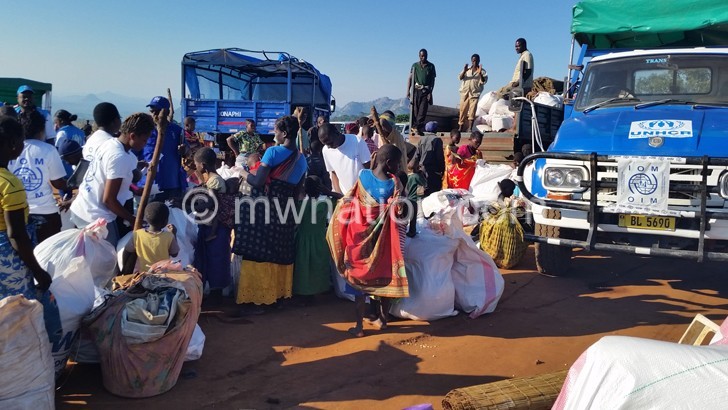Refugees, asylum seekers fleeing camp
They flee famine, insecurity, political conflicts and persecution in their countries for a comparably more peaceful life in Malawi.
But instead of sticking to their designated Dzaleka Refugee Camp in Dowa, as required by law, the refugees especially from East African nations, are alarmingly infesting the country’s towns and cities so much so that government is struggling to handle them.

In Malawi, several factors push refugees and asylum seekers to live in urban areas among them the deteriorating conditions, insecurity following occasional clashes between them and cut in food rations.
“Life is so tough in the camp. Horrible things happen. Even what we receive is not enough; that’s why those who cannot cope flee gain,” said Mike, a retailer in Manje, Blantyre from Gitega Province, Eastern Burundi.
By contrast, many view urban centres as opportune places for peaceful life, according to Mike who opted to have his surname concealed.
Monthly, each person in the refugee camp is supposed to receive 13.5 kilogrammes (kg) of maize flour, 1.5kg beans, 1.5kg soya-made flour for porridge and 0.75kg of cooking oil, according to Mike.
But another source close to the establishment said the quantities vary according to availability of items.

Last month, UNHCR and the World Food Programme (WFP) raised an alarm over the plight of the refugees and asylum seekers as they embarked on raising about K3 billion funding for food assistance.
Although UNHCR does not have official figures on refugees and asylum seekers living outside their designated areas, sources close to the establishment told Weekend Nation over 20 percent are integrated into local communities.
“UNHCR Malawi does not currently track the numbers of refugees living in different parts of the country,” senior protection officer for UNHCR Malawi Lisa Quarshie told Weekend Nation on Wednesday.
According to her, it is not UNHCR’s responsibility to ensure refugees and asylum seekers stay in the designated camp areas.
“It is a legal restriction in Malawi …and is regulated by the government,” added Quarshie.
Regrettably though, some are committing grave offences such as homicide and armed robbery as confirmed by the arrests of some of them and ongoing court cases,
Senior State advocate Pilirani Masanjala, who is Ministry of Justice and Constitutional Affairs spokesperson, revealed in May this year, that at least 20 refugees and asylum seekers were answering homicide-related cases committed outside their designated area.
Malawi has been hosting refugees and asylum seekers since the 1990s and currently, according to the November 2018 statistics from the United Nations High Commissioner for Refugees (UNHCR), there are 37 333 with 5 689 registered in 2018.
The number has swelled from around 17 000 in 2013 as new refugees and asylum-seekers, particularly from the Democratic Republic of Congo (DRC), are arriving each month. Others come from Rwanda, Burundi, Ethiopia and Somalia, according to authorities.
Ministry of Home Affairs Nicholas Dausi could not be reached as he is reported to be out of the country but government spokesperson Henry Mussa, who is also Minister of Information and Communications Technology, agreed with Quarshie in an interview saying it is illegal for any refugee or asylum seeker to be found outside the designated camps without permission.
He said: “They are guided by the country’s laws. If they are found out of the designed areas without permission, honestly that is illegal and our law enforcement agencies are supposed to act.
“But let me check with our colleagues at Immigration what is going on because the law is clear and if they are freely allowed outside and owning property, we need to dig deeper and appreciate the cause.” But Mussa could not be reached by press time.
Last year, there was an upsurge in cases of murder and serial attacks at Dzaleka Camp among Hutus and Tutsis.
“The camp is fast becoming a fully-fledged battlefield for Hutus and Tutsis,” Ndayambashi Muhammad a Hutu who has been at the camp for close to a decade was recently quoted by the media.
Among the most serious crimes committed involved two Burundian refugees Emmanuel Sekanao and Dezire Bintuari who, together with five Malawians, allegedly shot a Salima-based Burundian businessperson Vincent Niyongira on July 10 2017.
But the influx of refugees outside their designated areas, according to a security analyst Alex Chisiano, is a national threat not only to indigenous citizens but to the country as a whole because of the foreigners’ restricted personal history.
“Our regulatory framework is also very weak, that is why you find these refugees, asylum seekers and other illegal immigrations freely residing and trading outside their designated areas.
Although Malawi, through her 1989 Refugee Act, recognises the 1951 Convention alongside the 1969 OAU Convention, government made a number of reservations to the convention.
Specifically, in Article 17 and 26 of the 1951 Convention, government stated that it “does not consider itself bound to grant a refugee who fulfils any of the conditions set forth in subparagraphs (a) to (c) to paragraph (2) of article 17 automatic exemption for the obligation to obtain a work permit,” according to Quarshie.
In respect of article 17 as a whole, government stated it “does not undertake to grant to refugees rights of wage earning employment more favourable than those granted to aliens generally.”
Further, in respect of article 26 of the 1951 Convention government reserves its right to designate the place or places of residence of the refugees and to restrict their movements whenever considerations of national security or public order so require.”
This reservation, according to UNHCR, could allow government to restrict movement of refugees by designating a place where they should live. ccording to Quarshie, the UNHCR promotes peaceful coexistence and supports local integration through interaction with the host community and encouraging refugees and the communities hosting them to co-exist as a durable solution. n





